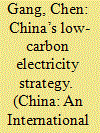|
|
|
Sort Order |
|
|
|
Items / Page
|
|
|
|
|
|
|
| Srl | Item |
| 1 |
ID:
146674


|
|
|
|
|
| Contents |
With a carbon-constrained new normal that emissions of greenhouse gases can no longer be assumed to be costless, non-fossil fuels including hydro, nuclear, wind and solar power have witnessed fast growth in both production and consumption in China. In promoting the production of different low-carbon alternatives, the Chinese government has been adjusting its policy prioritisation from time to time in targeted growth scopes, subsidy amount, on-grid tariffs and other financial incentives for various low-carbon power sectors. China’s Five-Year Plans have been playing a vital role in engendering fierce competition within the low-carbon energy sector. Other variables, like adjustment of electricity tariffs, inherent geographical and meteorological advantages related to certain types of power generation, domestic supporting industries, technological competitiveness and environmental concerns, have also helped to reshape the low-carbon power market.
|
|
|
|
|
|
|
|
|
|
|
|
|
|
|
|
| 2 |
ID:
091657


|
|
|
|
|
| Publication |
New Jersey, World Scientific, 2009.
|
| Description |
xxvi, 172p.Hardbound
|
| Series |
Series on contemporary China- Vol. 17
|
| Standard Number |
9789812838698
|
|
|
|
|
|
|
|
|
|
|
|
Copies: C:1/I:0,R:0,Q:0
Circulation
| Accession# | Call# | Current Location | Status | Policy | Location |
| 054435 | 363.7/GAN 054435 | Main | On Shelf | General | |
|
|
|
|
| 3 |
ID:
172271


|
|
|
|
|
| Summary/Abstract |
In the early stage of reform, Chinese technocrats with engineering backgrounds like Li Peng, Hu Qili and Jiang Zemin were promoted to top positions in the Communist Party's Politburo Standing Committee. During Jiang's and Hu's tenure, more technocrats were promoted, and an increasing proportion had educational background in the social sciences rather than in engineering and the natural sciences. After Xi Jinping came to power in 2012, a large number of technocrats with working experiences in the military and aerospace industries, or training in social sciences, especially economics, were promoted to key positions. The growing number of technocrats in the Party-state also reflects China's transition from Mao's society ruled by warriors to the industrial society ruled by engineers, planners and producers in the reform era. In the transition from industrial (mass production) to post-industrial (service-oriented) society, China's technocracy is shifting its centrality towards new science-based industries like artificial intelligence, aerospace technology and telecommunications.
|
|
|
|
|
|
|
|
|
|
|
|
|
|
|
|
| 4 |
ID:
088507


|
|
|
|
|
| Publication |
2009.
|
| Summary/Abstract |
The way in which China is selecting its top leaders is perhaps changing, reflecting some new socio-cultural trends in current Chinese elite politics. Xi Jinping has at least three things going for him: his princeling background, his clean reputation and his pro-business performance. However, before 2012 he has yet to pass several other tests before possibly stepping into Hu Jintao's shoes, especially those concerned with diplomatic affairs.
|
|
|
|
|
|
|
|
|
|
|
|
|
|
|
|
|
|
|
|
|